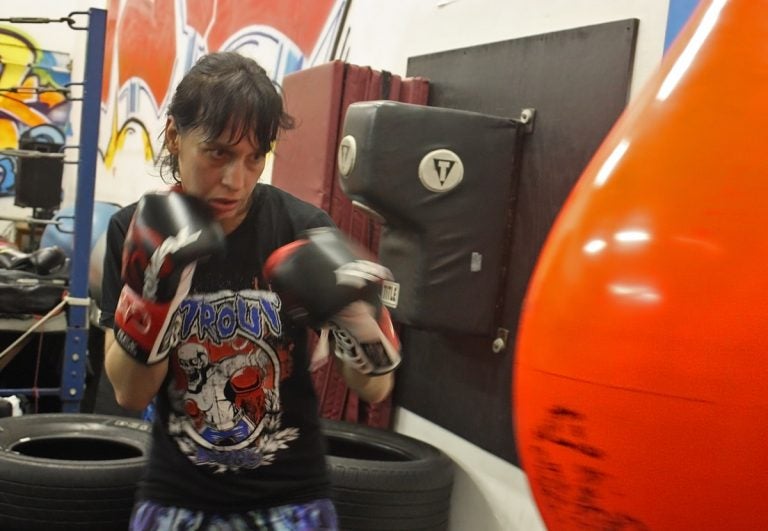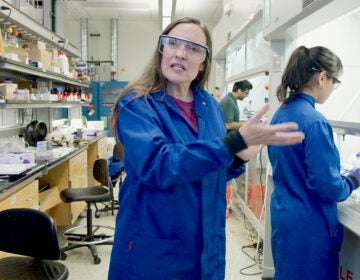Astrophysicist explains how boxing makes her a better scientist
Federica Bianco says colleagues from both careers are surprised at her alternate identity, but each role enhances the other.
Listen 05:26
Federica Bianco spends at least an hour training in a boxing gym everyday, more if she has an upcoming fight. (Alan Yu/WHYY)
A doctor once told Federica Bianco he had trouble imagining someone who looked like her doing astrophysics. At the time, he was stitching her hand, which she had cut while cooking. She recalls having to ponder her reaction.
“On one hand, I didn’t really want him to poke my hand through. On the other hand, I thought that was a really enraging comment,” she said. “I don’t like being told that I cannot do things and I kind of want to … react to that by showing that I can.”
Bianco is an astrophysicist at the University of Delaware, as well as a professional boxer, with four wins and one loss.
“I think that is something to being in a male-dominated sport or in a male-dominated activity that must speak to me, because I do both physics and boxing and they’re both obviously very male-dominated fields.”
She’s used to both scientists and boxers being surprised at her other identity.
“Boxers are always surprised, which is intriguing because there are boxers all over the spectrum, photographers, performance artists, writers … so I am not sure why astrophysicist would stick out, but it does.”
She said there are people in the boxing world who think women shouldn’t be boxers: Female boxers are paid nowhere near as well as their male counterparts, some managers just don’t work with women, and women’s boxing didn’t become an Olympic sport until 2012.
And, in an oddly specific way, there are also scientists who think she shouldn’t be fighting, she said, “meaning that … if they think about boxing as a very violent sport, they may not see that as on the same ethical level as something as noble as science.”
But most of her colleagues are supportive and appreciate her challenging the stereotype of a scientist. “To show that scientists are not just lab rats, but also have lives and interests, and all possible passions, including combat sports.”
She said it’s ridiculous to think that scientists would think about their work 100 percent of the time. “Would make for a very bad scientist, I think.”

“One thing that boxing really improved for me is my self-confidence, my ability to withstand stress and to think about problems calmly and lucidly, ‘cause that’s really all that boxing is about. So as a woman in science, it increased my confidence, it increased my self-esteem, and that is just priceless.”
Bianco says boxing actually makes her a better scientist.
“They’re both problem-solving activities. When you’re boxing, you’re really faced with a puzzle, and the skill is to not to get overwhelmed and to see what the other person does wrong so that you can take advantage of that. That is a puzzle. And so is science, right? You’re faced with a problem, and you have to figure out what is the right strategy to address it.”
“I think that doing multiple things improves your ability to think about a problem from multiple angles, and so improves your creativity ultimately,” she said.
And thinking about a problem from multiple angles is what she enjoys doing in her scientific career. As an astrophysicist, she studies how stars change in the night sky, which is called time-domain astronomy. But she also applies her data-analysis skills to studying prosecutorial delays and smoke plumes of pollution from buildings. That’s something she hopes to pass on to her astronomy students.
“We tend not to tell our students that they’re really data-analysis experts, and they’re really marketable skills, when they come out of astronomy. Not just understanding how stars work, which is great, nothing wrong with understanding how stars work … but understanding how to use data to figure out how stars work, that is truly something that has a lot of value in any field.”
WHYY is your source for fact-based, in-depth journalism and information. As a nonprofit organization, we rely on financial support from readers like you. Please give today.







